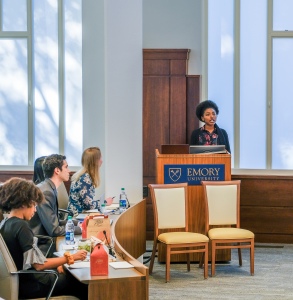
by Kira Tucker, 20C English and Creative Writing
2019-2020 Halle/Fox Center Global Research Fellow
As a prospective college student, I envisioned a future as a U.S. diplomat. I spent years taking high school Russian classes, attended a Governor’s School for International Studies, and immersed myself in the arena of global affairs. Amid my “political overload” during the 2016 election, I quickly found my true passions not in news headlines but in the lines of poetry and prose filling my readings. I continued my Russian and Political Science courses, but I also began to rekindle my love for literature as a serious pursuit. From my first introduction to the great Russian poet Anna Akhmatova, her poetry captivated me—her poignant imagery of love and terror transported me to the height of Soviet life and resonated long after my eyes left the page.
As I read and reread Akhmatova’s poetry, I was driven to pinpoint what made her work so gripping. In my readings about the Soviet era, I encountered Akhmatova’s remarkable critique of the patriarchal tradition, in which she said: “to be a woman and a poet is absurd.” I had to pursue the idea further. What if the absurd could be a frame for understanding the conditions of Soviet Russia? A regime that was violently repressive against its own citizens to the point of illogic. The paradox of making life more livable through art that might get you killed. As a longtime student of Russian language and literature, I dreamt of going to Russia. The potential for archival resources to enrich both the breadth and depth of my analysis was invaluable.
The Halle-FCHI Global Fellows Program allowed me to encounter Akhmatova not only in the archive but memorialized in the physical landscape of Moscow and St. Petersburg. I visited the house where writers gathered alongside Akhmatova to preserve their craft while escaping raids for suspected radical dissidents. I read her original letters and manuscripts, saw the portraits and songs she composed in retreat from the harshness of Communist life. I spoke with literarians whose perspectives illuminated and transformed my approach to scholarship. Moving forward, I aim to channel Akhmatova’s inspiration and harness my own poetic power as I allow my creative work to inform, challenge, and expand the possibilities of my literary study.
Kira Tucker is a senior majoring in English and Creative Writing with a minor in Linguistics. She is completing a senior capstone research project as well as an honors thesis in poetry. In her literary research, Kira comparatively analyzes select works by poets Anna Akhmatova and Natasha Trethewey to understand marginalized women’s resistance within the Stalinist Soviet Union and pre-Civil Rights American South. Kira explores a process she terms lifemaking, demonstrating how artistic practice can offer a means of surviving oppressive social conditions. In her honors thesis, Kira will further develop these themes by drawing on her lived experience and employing the power of her own poetic eye.
